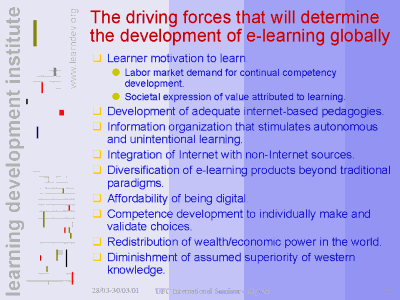Slide 22 of 24
Notes:
* Learner motivation to learn.
This has a specific component in so far as learning is narrowly defined as a way to acquire particular skills, in which case motivation depends, among other things, on the market. It also has a generic component, related to a wider definition of learning as a disposition to engage in dialogue with one's environment for the purpose of constructive interaction with change. In this latter sense, motivation will depend on the extent to which people feel that they are active members of their communities. This kind of motivation thus depends on how communities and societies show that they value learning. There are thus two corollaries to this driver, namely:
o Labor market demand for continual competency development.
o Societal expression of value attributed to learning.
* Development of adequate internet-based pedagogies.
Such pedagogies are adequate when learners find that they can satisfy their learning needs - in the two senses defined above - through learning processes based on these pedagogies. This driver assumes that learning is a consequence of instruction, which is partly the case. There is also much learning that people engage in deliberately but entirely autonomously as well as learning that goes on unintentionally. The next driver refers to these cases.
* Information organization that stimulates autonomous and unintentional learning.
This driver basically comes down to how exciting, from a learning perspective, it is to access sources on the Internet and to integrate one's use of such information in processes that are also linked to other sources of information that people use to learn. This leads to the next driver.
* Integration of Internet with non-Internet sources.
We live not by the Internet alone. Learning is an astoundingly complex phenomenon. Many different factors intervene in facilitating it. Whatever the Internet may mean to it is only partial. To account for the complexity of the phenomenon, and to ensure that learners will be able to make e-learning part of their wider lifelong pursuit to learn, it is essential that smooth integration be reached among the different sources to which people will seek access while engaging in their learning endeavors.
* Diversification of e-learning products beyond traditional paradigms
The sad tendency of current e-learning products is to model themselves on the outdated practices of classroom-based teaching/learning. Most of these practices are not only pedagogically questionable, they are also out of tune with the learning requirements of the 21st century. If e-learning continues to be no more than a replica, built with new means, of the classroom model, then I foresee that learners will soon be turned off. Creativity and imagination are required to create a learning reality, using, among other things, digital technologies, that truly respond to the learners' needs and desires to make learning a rich and exciting experience.
* Affordability of being digital
Part of this driver refers to the divide in financial/material conditions that have been widely explored in the debate about the so-called digital divide. There are, however, also dimensions of affordability that relate to space/time conditions, culture conditions, and the ability to deal with frustration. Regarding the latter aspect, note that for many people who have to be brought into the digital fold, there is no specific encouragement to step over the threshold. Any frustration they meet in doing so will hold them back.
* Competence development to individually make and validate choices
The Internet/Web is rapidly becoming a library of everything. Unlike the traditional library, with pre-selected sources, accessing and using Internet-based sources randomly is about as useful as consulting a stranger at the sidewalk cafe or trying to engage in intelligent discussion with the person sitting next to you on the plane (actually, on my last flight from Detroit to Paris I had the good luck to share two interior economy class seats in a fully-packed row of five with a person with whom I had an inspiring conversation, but this is rare). Faced with the tremendous wealth of Internet-based information amidst a lot of rubbish, people can no longer rely on the traditional mechanisms to make choices. A higher level of individual and group competence is required to make intelligent choices and to validate them individually.
* Redistribution of wealth/economic power in the world
This driver is often 'forgotten' in the debate about the digital divide. Unless we come to an equitable distribution of resources and the power to exploit them around the world, there will be no global e-learning. However, there will be learning, all around the globe, as it has always been there. The problem is that the learning of some people is not recognized as such by those who have the power to impose their definitions of learning on the rest of us. See also next point.
* Diminishment of assumed superiority of western knowledge
For learning - I mean the dialogic process it entails - to be engaged in by communities whose members are spread around the globe, it is necessary that we get rid of the assumption that the state of development in the industrialized world is superior to the achievements in the rest of the world. When it is recognized that there is a need for learning on both sides of the development barrier, and that such learning may be inspired by dialogue with those who live on the other side of the barrier, then a great step forward towards global learning will have been made.















